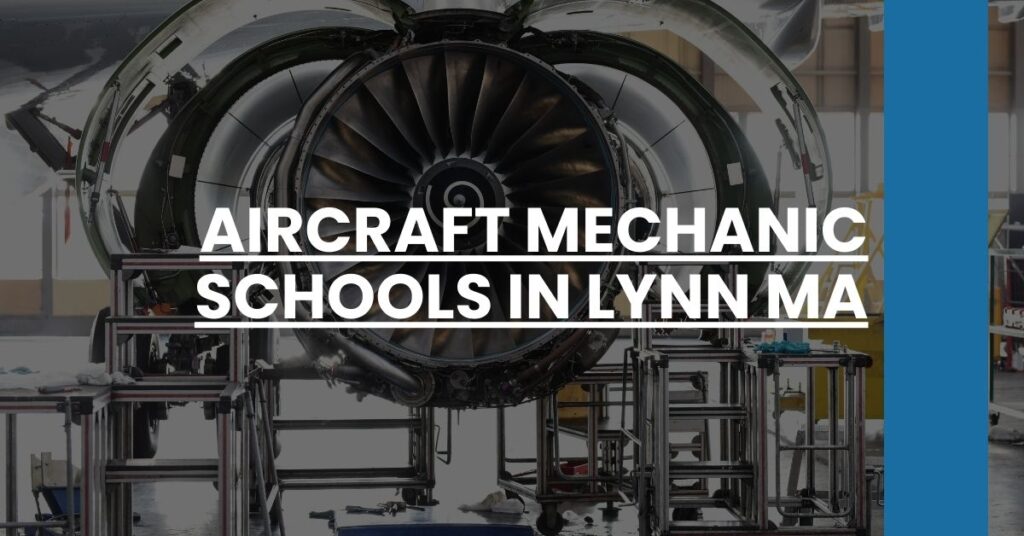Not in Lynn? Check out our lists of Aircraft Mechanic Schools in Boston, Brockton, Cambridge, Lowell, New Bedford, Quincy, Springfield, Worcester, and across Massachusetts.
Are you ready to launch a career in aviation? Finding the best training is crucial. In this post, we uncover the top Aircraft Mechanic Schools in Lynn, MA.
Discover where to gain the skills you need to succeed in this high-demand field.
Middlesex Community College and National Aviation Academy – Aviation Maintenance Technology A.S. Degree Program
Starting a career in aviation maintenance? Middlesex Community College (MCC) and National Aviation Academy (NAA) offer an excellent program to get you off the ground. Their Aviation Maintenance Technology Associate in Science, Liberal Studies program at Hanscom Air Field in Bedford, MA, blends academic learning with hands-on training, setting you up for success.
You will complete requirements at NAA, involving rigorous practical training. Then, transfer your NAA Maintenance Certificate transcript to MCC, fulfilling the associate degree requirements. This approach allows you to gain both theoretical and practical skills efficiently.
You can expect:
- Hands-on Training: Direct experience through aircraft maintenance instruction at NAA.
- Academic Excellence: Theoretical knowledge foundation from MCC.
- Career Readiness: Opportunities in airlines, engine manufacturing, and positions like maintenance controllers or field service technicians.
This partnership aims to produce graduates ready to thrive and advance in the aviation industry swiftly.
Learn more about the program at Middlesex Community College’s website.
Lynn University – Aviation Operations Program
Lynn University’s Aviation Operations program equips you with a deep understanding of aviation management and operations. This program covers fundamental and advanced topics in aviation, preparing you for various roles in the industry.
The curriculum blends business and technical training, addressing topics such as:
- Aviation Safety: Ensuring operations meet stringent safety standards.
- Meteorology: Understanding weather impacts on aviation.
- Aircraft Selection: Learning to choose the right aircraft for various operations.
- Airport Management: Gaining insights into efficient airport operations.
Faculty members bring rich industry experience and advanced academic credentials to their teaching, enriching your learning experience. Graduates can pursue careers as airfield operations specialists or fixed base operation managers, though FAA certifications must be pursued independently.
Although additional costs for some courses may apply, the program offers valuable education in both the technical and business aspects of aviation.
Explore Lynn University’s Aviation Operations program to advance your career in aviation.
What to Consider When Choosing an Aircraft Mechanic School
Choosing the right aircraft mechanic school can set the stage for a thriving career in aviation. Here are several important factors to keep in mind to ensure you select the best program that fits your needs.
- Accreditation: Make sure the school is accredited by credible organizations, such as the Federal Aviation Administration (FAA) or other recognized aviation authorities. Accreditation assures that the program meets industry standards and provides high-quality education.
- Curriculum: Look for schools that offer a robust curriculum combining both theoretical knowledge and hands-on practical skills. Programs with real-world training components are essential for developing the technical expertise required in aircraft maintenance.
- Faculty Expertise: Quality instruction is a cornerstone of a good education. Verify that the faculty members have significant industry experience and advanced qualifications. Experienced instructors can offer invaluable insights and mentorship.
- Facilities and Equipment: Adequate facilities and up-to-date equipment, such as state-of-the-art labs, tools, and aircraft, are critical for practical training. Ensure the school has the resources to provide training that mirrors the real-world environment.
- Job Placement Services: Supportive job placement services are a key indicator of a well-rounded program. Look for schools that offer career counseling, internship placements, job fairs, resume workshops, and networking opportunities with industry professionals.
- Location: Proximity to major airports or aviation hubs can provide advantageous practical training opportunities and internships. Consider whether the school is in a region where the aviation industry is active and growing.
- Financial Considerations: Understand the costs involved, including tuition fees, additional course costs, financial aid options, and scholarships. It’s important to evaluate the financial aspects to make an informed decision that aligns with your budget.
Researching these factors thoroughly will help you choose an aircraft mechanic school that not only aligns with your career objectives but also provides the education and opportunities required for success in the aviation industry.
Conclusion: Where to Begin Your Aircraft Mechanic Journey
Embarking on a career as an aircraft mechanic starts with choosing the right school. By considering factors such as accreditation, curriculum, faculty expertise, facilities, job placement services, location, and financial considerations, you can make an informed decision that sets you on the path to success. Explore the programs at Middlesex Community College and National Aviation Academy and Lynn University. These institutions offer robust training that prepares you for a rewarding career in the aviation industry. Start your journey today by choosing the right program to meet your career goals and aspirations.

